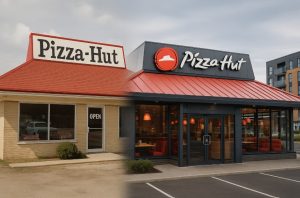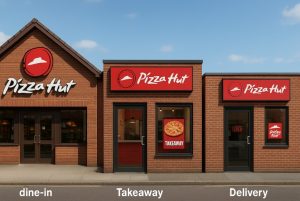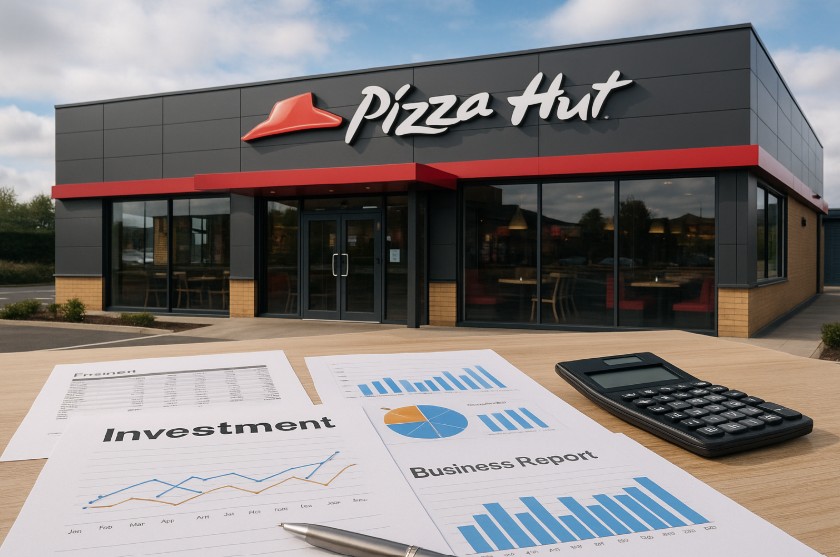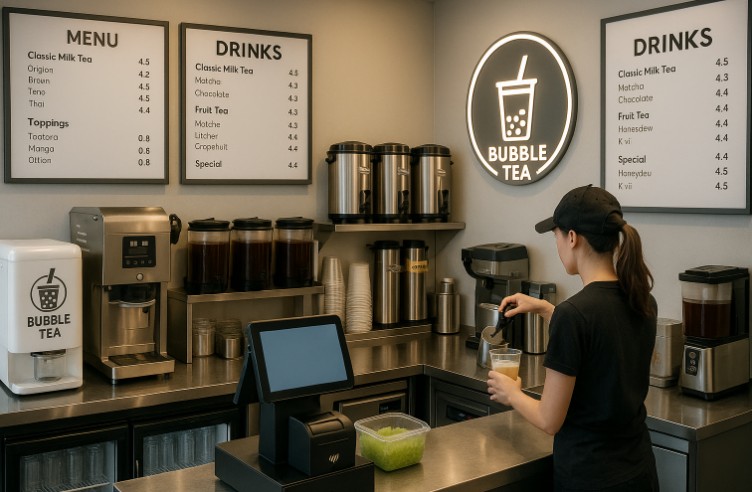Franchising with a leading global brand like Pizza Hut is a major attraction for aspiring entrepreneurs in the UK.
As one of the most recognised pizza chains worldwide, Pizza Hut provides a strong brand identity, established business model, and ongoing franchise support.
However, like many large-scale fast-food brands, investing in a Pizza Hut franchise requires significant financial resources, industry experience, and a long-term commitment.
This guide explores the Pizza Hut franchise cost in the UK, including fees, requirements, profitability, and the application process.
What Is The Background Of Pizza Hut As A Franchise?

Pizza Hut’s franchise journey began in 1959, just one year after the company opened its first restaurant in Kansas.
Since then, the brand has become one of the most prominent names in the global fast-food industry. Owned by Yum! Brands, Pizza Hut operates under a franchise model that allows investors to use its well-established systems, recipes, and branding.
Over the years, Pizza Hut has adapted its offerings to suit different markets, from casual dine-in restaurants to delivery-focused outlets.
In the UK, the brand is seen as both a dine-in option and a convenient takeaway provider. This versatility has helped it grow and remain competitive in an industry dominated by other major players like Domino’s and Papa John’s.
How Many Pizza Hut Stores Are There In The UK And Globally?
Pizza Hut has built a massive global presence with more than 19,000 outlets across over 100 countries. In the UK alone, there are more than 500 Pizza Hut stores, ranging from large sit-down restaurants to smaller delivery-based outlets.
The brand’s scale is one of its strongest advantages. For a prospective franchisee, joining a network of this size means benefiting from:
- Strong brand recognition
- Access to global marketing campaigns
- Established supply chains
- Shared innovations in menu design and technology
What Is The Required Net Worth And Liquid Cash To Start A Pizza Hut Franchise?
Becoming a Pizza Hut franchisee requires substantial financial resources. The brand sets strict eligibility standards to ensure franchisees have the capability to manage large operations. The financial requirements include:
- Minimum net worth of £700,000
- At least £350,000 in liquid cash
These thresholds are necessary because of the high initial investment and the ongoing costs associated with running a Pizza Hut outlet. Beyond finances, the company looks for candidates with prior management or hospitality experience.
Pizza Hut also favours franchisees who take an active role in operations rather than acting as passive investors.
How Much Does It Cost To Open A Pizza Hut Franchise In The UK?
The total cost to open a Pizza Hut franchise in the UK varies between £500,000 and £2,053,000. This wide range depends on factors such as:
- Location and property size
- Type of franchise model selected
- Level of building and site development required
In addition to these setup costs, there is a standard franchise fee of £25,000. This fee covers the rights to operate under the Pizza Hut brand, use its business systems, and receive initial training and support. Military veterans may qualify for a discount on this fee.
What Are The Different Types Of Pizza Hut Franchise Models Available?

Pizza Hut recognises that different markets and locations require unique approaches, which is why it offers multiple franchise formats. These models allow franchisees to select the format that best aligns with their budget, property size, and target customers.
Restaurant-Based Delivery (RBD)
The Restaurant-Based Delivery model is the traditional full-service Pizza Hut restaurant. It offers dine-in facilities along with takeaway and delivery options. RBD outlets usually require the highest level of investment because they:
- Occupy larger premises in high-traffic areas
- Need full restaurant facilities and staff
- Require significant building improvements and equipment
RBD restaurants are best suited to urban centres, retail parks, and areas where customers expect a sit-down dining experience as well as delivery.
Delivery-Based Restaurant (DBR) / Fast Casual Delco (FCD)
The DBR or FCD model focuses primarily on delivery and takeaway while offering limited seating for customers who want to eat in. These outlets provide a balance between the full-service RBD and the smaller Delco format.
Key advantages of the DBR/FCD model include:
- Lower setup costs compared to RBD
- Flexibility to operate in medium-sized spaces
- Ability to serve both dine-in and delivery customers
This format is particularly effective in suburban areas where takeaway demand is strong but there is still occasional dine-in traffic.
Delivery/Carryout (Delco)
The Delco model is designed exclusively for delivery and collection. There are no dine-in facilities, which keeps setup and running costs lower.
Typical features of Delco outlets include:
- Compact spaces located in residential or high-demand delivery areas
- A focus on speed, efficiency, and high delivery volumes
- Lower staffing needs compared to RBD and DBR models
Delcos are ideal for areas where convenience and delivery dominate customer demand, making them an increasingly popular choice in the UK market.
What Ongoing Fees Do Pizza Hut Franchisees Need To Pay?
Once a Pizza Hut outlet is up and running, franchisees must cover ongoing fees to support brand growth, marketing campaigns, and operational systems. These charges are a crucial part of the franchise agreement and apply to all outlets regardless of their size or model.
Royalty And Service Fees
Pizza Hut franchisees are required to pay a monthly royalty fee of 6% of gross sales, although this may rise to 6.5% in certain circumstances. This fee gives franchisees continued access to Pizza Hut’s systems, brand name, and operational support.
Advertising Contributions
Franchisees must also contribute to the national advertising fund, set at 4.75% of gross sales. This fund supports:
- Television and digital advertising campaigns
- National promotional offers
- Brand-building initiatives
The centralised approach ensures that all franchisees benefit from large-scale marketing efforts they would not be able to fund individually.
PHFHA Dues
The Pizza Hut Franchise Holders Association (PHFHA) collects dues of 4.75% of gross sales. These fees go towards franchise representation, ongoing support, and initiatives that strengthen the franchise network as a whole.
Technology And Digital Fees
Operating a modern fast-food franchise requires investment in technology. Pizza Hut charges:
- £2,800 per year as a technology fee
- £0.41 per digital transaction processed through the Pizza Hut app or website
- Additional help desk charges of £12 per call or £7 for online service requests
These fees cover system maintenance, app development, and technical support.
Other Charges
Franchisees may also encounter other ongoing charges such as:
- Transfer fees: £2,500 for the first restaurant, then £250 for subsequent outlets when ownership changes
- Late payment fees:5% monthly charge on overdue payments
- Miscellaneous support costs: fees for additional training, site visits, or promotional activities when applicable
These costs ensure the consistency and quality of the Pizza Hut experience across all outlets.
What Is The Estimated Breakdown Of Pizza Hut Franchise Setup Costs?

The setup costs for a Pizza Hut franchise include a wide range of expenses, from property improvements to training programmes. Below is a detailed breakdown of estimated costs:
| Cost Category | Low Estimate | High Estimate |
| Franchise Fee | £25,000 | £25,000 |
| Equipment | £100,000 | £400,000 |
| Opening Inventory | £4,000 | £8,000 |
| Smallwares | £10,000 | £50,000 |
| Building and Site Improvements | £240,000 | £1,575,000 |
| Land/Leasehold | Varies | Varies |
| Computer System | £15,000 | £30,000 |
| Computer System Training | £0 | £1,500 |
| Miscellaneous | £10,000 | £22,000 |
| Advertising Expenses | £0 | £16,500 |
| Other Opening Costs | £3,000 | £4,000 |
| Additional Costs (3 Months) | £5,000 | £21,500 |
This cost structure highlights why Pizza Hut requires franchisees with strong financial backgrounds. The largest expense is often site development, which varies significantly depending on whether a new build or existing property conversion is required.
Are Pizza Hut Franchises Profitable In The UK?
Profitability depends on location, operational efficiency, and franchise model. On average, Pizza Hut outlets in the UK achieve the following:
- Full-service RBD restaurants: £973,000 annual revenue
- DBR/FCD and Delco restaurants: £960,000 annual revenue
With typical industry profit margins of 10% to 15%, franchisees can expect annual net profits ranging between £96,000 and £146,000.
The profit potential is considered strong compared to many other food franchises in the UK. However, investors must be prepared for a long-term commitment, as the initial investment can take several years to recover.
What Is The Failure Rate Of Pizza Hut Franchises?
Pizza Hut franchises have a relatively low failure rate compared to smaller, less established brands. Statistics show:
- Around 3% failure rate in the first year
- Approximately 8% failure rate by the third year
These figures suggest that Pizza Hut provides a stable investment opportunity, but it is not without risks. Competitive pressures, location challenges, and management decisions all influence outcomes.
What Territory Protection Does Pizza Hut Offer Its Franchisees?
Pizza Hut provides franchisees with a protected territory, typically a 500-yard radius around the store. Within this zone, no other franchisee can open the same type of Pizza Hut outlet, provided the existing franchisee meets all operational standards.
This arrangement helps reduce direct competition between franchisees, although it does not prevent the opening of a different Pizza Hut model nearby. For example, an RBD restaurant may still face a new Delco store within its protected zone.
What Training And Support Does Pizza Hut Provide To New Franchisees?
Pizza Hut ensures that new franchisees are well-prepared to operate their businesses through comprehensive training and ongoing support. The “First Slice” programme, lasting 8 to 12 weeks, includes:
- One-on-one meetings with Pizza Hut leaders
- In-restaurant training sessions
- Pizza preparation and product knowledge classes
- Completion of onboarding checklists
Support does not stop after opening. Franchisees also benefit from:
- National and regional marketing campaigns
- Access to operational and technical support
- Guidance on financing and expansion opportunities
- Regular updates to technology and systems
This level of structured training and support reduces the risk of failure and helps maintain consistent brand standards across all outlets.
Why Should Someone Invest In A Pizza Hut Franchise In The UK?

Investing in a Pizza Hut franchise offers several key advantages:
- Global brand reputation and customer loyalty
- Strong potential for revenue and profitability
- Multiple franchise models to suit different budgets and markets
- Comprehensive training and operational support
- Opportunities for multi-unit expansion
However, investors should be aware of the high entry costs and demanding financial requirements. The franchise is best suited to those with experience in managing hospitality businesses and the resources to handle large-scale investments.
What Is The Process Of Applying For A Pizza Hut Franchise?
The application process to become a Pizza Hut franchisee in the UK is structured and selective. It begins with submitting an application form to Pizza Hut’s franchise development team.
The steps typically include:
- Initial screening of financial background and experience
- Interviews and discussions with the franchise team
- Review of available franchise territories
- Signing of the franchise agreement
- Completion of training programmes
- Site acquisition and development
- Grand opening of the franchise location
From start to finish, the process can take six to twelve months depending on location availability and build-out requirements.
Conclusion
Opening a Pizza Hut franchise in the UK requires an investment ranging from £500,000 to over £2 million, along with meeting strict financial requirements.
While the costs are substantial, the potential profitability, brand recognition, and extensive franchise support make it a strong contender for investors seeking entry into the UK fast-food market. However, the decision should be weighed against the risks, competition, and long-term return on investment.
FAQs
What is the initial Pizza Hut franchise fee in the UK?
The initial franchise fee is £25,000, although discounts may apply for military veterans.
How long is a standard Pizza Hut franchise agreement?
The standard franchise term is ten years, with renewal options subject to meeting brand standards.
Can I own multiple Pizza Hut outlets in the UK?
Yes, multi-unit ownership is possible, but it requires significant additional investment and proven operational success.
Do I need prior hospitality experience to run a Pizza Hut franchise?
Yes, Pizza Hut prefers franchisees with hospitality management experience, ideally within the fast-food sector.
How long does it take to open a Pizza Hut franchise?
From application to opening, the process can take 6 to 12 months, depending on site availability and build-out requirements.
What financing options are available for Pizza Hut franchisees?
Franchisees can access third-party financing, including loans and franchise funding solutions from UK lenders.
Is Pizza Hut a better investment than other pizza franchises?
Pizza Hut offers strong brand recognition and profitability, but it requires higher upfront investment compared to smaller pizza franchises.
Related Articles:








